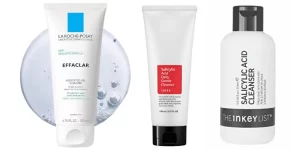
So you’ve just got a new tattoo and you’re feeling awesome. Congrats!
But before you show off your fresh ink to the world, you need to take good care of it.
And that means moisturizing it regularly.
But what should you moisturize your tattoo with?
There are so many lotions out there, some of which work really well for tattoo aftercare, while others are best avoided.
Some may contain ingredients that can irritate or harm your skin, while others may not provide enough hydration or protection.
So let’s help you choose between two popular brands of moisturizers that many people use for tattoo aftercare: Cerave and Lubriderm.
Let’s compare Cerave vs Lubriderm for tattoos.
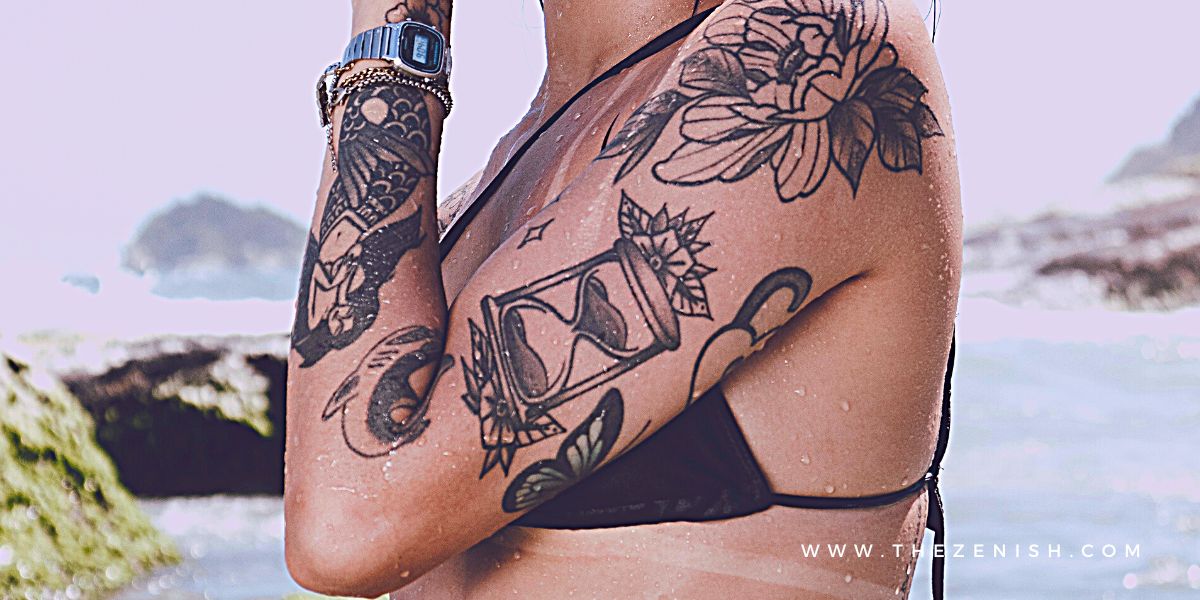
These are both well-known and trusted brands that offer a range of products for different skin types and needs.
But which one is better for your tattoo?
Let’s compare and contrast the ingredients, benefits, and drawbacks of these moisturizers.
I’ll also give you some tips on how to use them and where to buy them.
| this post may contain affiliate links, which means if you purchase from one of these links, I may receive a small commission at no additional cost to you. |
By the end of this article, you’ll have a clear idea of which moisturizer is better for your tattoo and why.
Let’s dive in!
Cerave: The Skin Barrier Booster
Cerave is known for hydrating and healing, so it’s a great choice for keeping your tattoos healthy, moisturized, and looking vibrant.
But what makes Cerave so special?
One of the main features of Cerave products is that they contain ceramides, which are lipids that help restore and protect the skin barrier.
Ceramides are essential for keeping the skin healthy, especially after getting a tattoo.
When you get a tattoo, you’re basically creating a wound on your skin that needs to heal properly.
If you don’t moisturize it, it can get dry, itchy and irritated. And that’s no fun at all.
Plus, if your skin barrier is compromised, your tattoo can get infected or fade faster.
That’s why you need ceramides to help repair and strengthen your skin barrier so that your tattoo can heal well and stay bright and beautiful.
Another ingredient in some Cerave products is hyaluronic acid, which is a humectant that helps retain moisture and plump the skin.
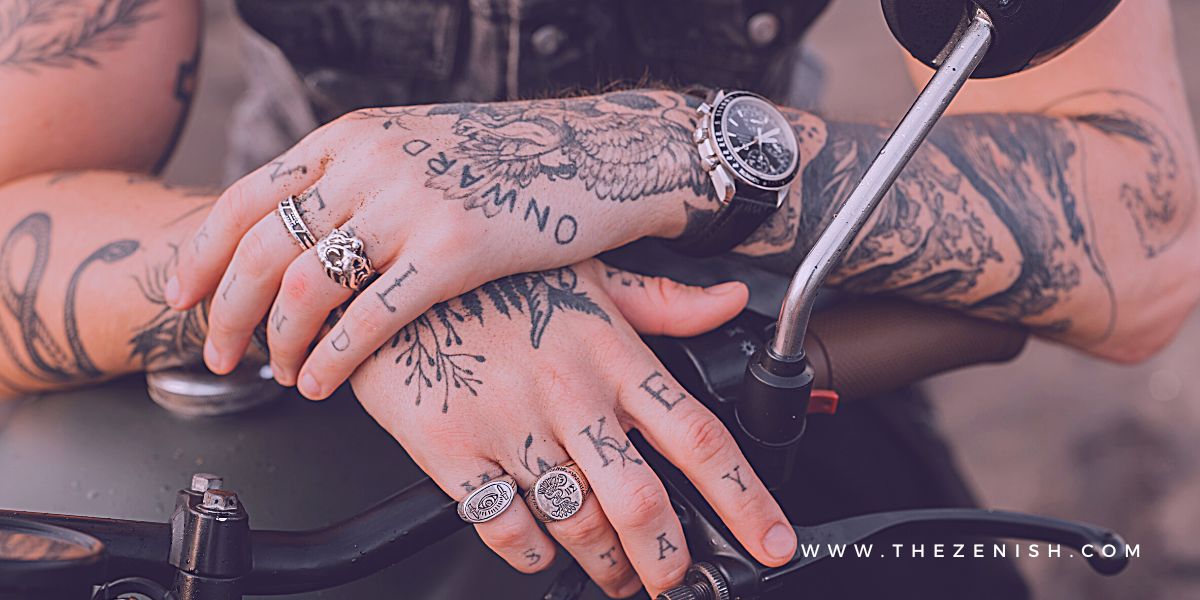
Hyaluronic acid can help prevent the tattoo from drying out and cracking, which could potentially damage the design and lead to scarring.
Additionally, hyaluronic acid can make your skin look smoother and more supple, enhancing the overall appearance of your tattoo.
A third ingredient in Cerave products is dimethicone, which is a silicone-based polymer that helps form a protective layer on the skin.
Dimethicone serves as a shield for tattoos, protecting them from external irritants and bacteria that may lead to infection or inflammation.
And, it can help minimize friction and chafing, which can potentially damage the tattoo or cause discomfort.
Cerave products are also fragrance-free and non-comedogenic, which means they won’t cause allergic reactions or clog the pores.
This is important for tattoo aftercare because you don’t want to irritate or inflame your skin with harsh chemicals or fragrances.
You also don’t want to cause breakouts or acne on your tattooed area, which can affect the healing process and the quality of your ink.
Cerave: The Drawbacks
However, Cerave also has some drawbacks that you should be aware of before using it on your tattoo.
One of them is that it contains parabens, which are preservatives that may cause irritation or allergic reactions in some people.
Parabens are also controversial because of their potential hormonal effects.
Some studies have linked parabens to breast cancer and reproductive issues, although more research is needed to confirm these claims.
Another drawback of Cerave is that it can feel excessively thick or greasy, especially for those with oily or acne-prone skin.

Some people may also find that Cerave products are too heavy or occlusive for their tattoos, causing discomfort or a sweaty sensation.
Some people may also prefer a lighter or more watery texture for their moisturizer, which can absorb faster and feel more refreshing.
Lubriderm: The Moisture Maker
Lubriderm is another popular brand known for its moisturizing and soothing properties, making it a good option for nourishing and protecting your new tattoo.
But what makes Lubriderm so effective?
One of the main features of Lubriderm products is that they contain glycerin, which is a humectant that helps moisturize and soften the skin.
Glycerin is a great way to keep tattoos hydrated and smooth, preventing scabbing and peeling.
It can also attract water from the air and the deeper layers of the skin, which helps boost the moisture level of your tattoo.
Another ingredient that Lubriderm products have is panthenol, which is a form of vitamin B5 that helps soothe and heal the skin.
Panthenol can reduce inflammation and redness around the tattoo, which can make it look more clear and crisp.
Panthenol can also promote faster healing, which can shorten the recovery time of your tattoo.
Lubriderm products are also fragrance-free and non-greasy, which means they won’t irritate or leave a residue on your skin.
Lubriderm: The Drawbacks
However, there are some drawbacks to using Lubriderm on your tattoo that you should be aware of.
Lubriderm lotion may not offer sufficient hydration or protection for very dry or sensitive skin.
Some people find them too light and watery for their tattoos, which can leave their skin feeling dry or tight.
Some people may also prefer a richer or more occlusive texture for their moisturizer, which can lock in more moisture and prevent infection.
Cerave vs Lubriderm for Tattoos: Best Products
So which brand should you choose for your tattoo?
Well, it depends on a few things, like your skin type, preference and budget.
But to make it easier for you, we’ve picked some products from each brand that are suitable for tattoos.
Here they are:
Cerave Healing Ointment
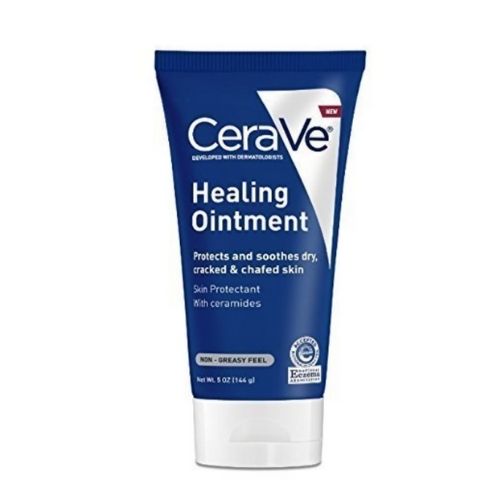
This is a rich and occlusive ointment that can help heal and protect your new tattoo.
It has ceramides, hyaluronic acid, petrolatum, and lanolin that can lock in moisture and prevent infection.
It also has a non-sticky and non-greasy texture that won’t stain your clothes or sheets.
You can apply it as often as needed to keep your tattoo moist and comfortable.
Pros:
- Heals and protects the skin
- Locks in moisture and prevents infection
- Non-sticky and non-greasy
- Fragrance-free
Cons:
- May be too heavy or occlusive for some skin types
- Contains lanolin that may cause allergic reactions in some people
- May be more expensive than other products
You can buy it online here: CeraVe Healing Ointment
Lubriderm Daily Moisture Hydrating Unscented Body Lotion
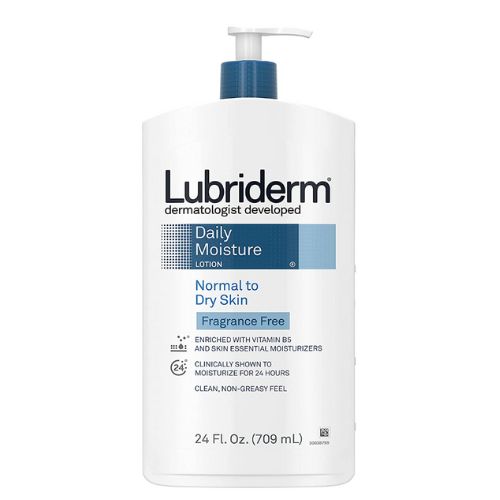
This is a lightweight and fast-absorbing lotion that can hydrate and nourish your new tattoo.
It has glycerin, mineral oil, dimethicone, and vitamin B5 that can moisturize, soften and soothe your skin.
It also has a fragrance-free and non-comedogenic formula that won’t irritate or clog your pores.
You can apply it two to four times a day to keep your tattoo healthy and vibrant.
Pros:
- Hydrates and nourishes the skin
- Moisturizes, softens, and soothes the skin
- Fragrance-free and non-comedogenic
- Affordable and widely available
Cons:
- Contains mineral oil that may clog pores or cause breakouts in some people
- Contains parabens that may cause irritation or allergic reaction in some people
- May not provide enough hydration or protection for very dry or sensitive skin
You can buy it online here: Lubriderm Daily Moisture Hydrating Unscented Body Lotion
Cerave Moisturizing Cream
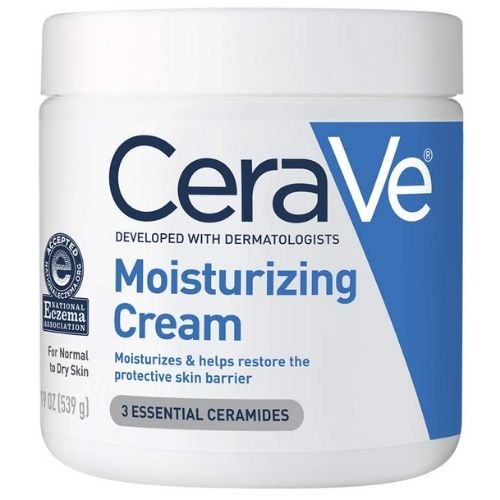
This moisturizer is thick and creamy, perfect for hydrating and protecting your new tattoo.
It contains ceramides, hyaluronic acid, petrolatum, and cholesterol to restore and strengthen the skin barrier.
Plus, it has a fragrance-free and non-comedogenic formula, so it won’t irritate or clog your pores.
You can apply it once or twice a day to keep your tattoo smooth and supple.
Pros:
- Hydrates and protects the skin
- Restores and strengthens the skin barrier
- Fragrance-free and non-comedogenic
- Suitable for dry to very dry skin
Cons:
- Can feel thick and greasy on the skin
- Contains petrolatum that may cause allergic reactions in some people
- May be more expensive than other products
You can buy it online here: Cerave Moisturizing Cream
Cerave Hydrating Cleanser
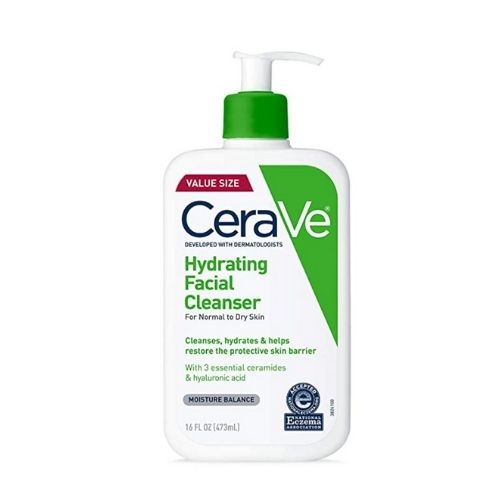
This cleanser is gentle and hydrating, making it perfect for cleaning and soothing your new tattoo.
It contains ceramides, hyaluronic acid, and glycerin, which help restore and retain moisture in the skin.
It’s fragrance-free and non-comedogenic, so it won’t strip your skin barrier or irritate your skin.
You can use it once or twice a day to keep your tattoo free of dirt and bacteria.
Pros:
- Cleans and soothes the skin
- Restores and retains the skin’s moisture
- Fragrance-free and non-comedogenic
- Suitable for all skin types
Cons:
- May not remove all traces of makeup or sunscreen
- May not lather well
- May be more expensive than other cleansers
You can buy it online here: Cerave Hydrating Cleanser
FAQ
How often should I apply lotion to my tattoo?
The general rule of thumb is to apply lotion to your tattoo as often as needed to keep it moist and comfortable.
This may vary depending on your skin type, the size, and location of your tattoo, the climate, and the season.
However, a good guideline is to apply lotion two to four times a day for the first few weeks after getting your tattoo.
You don’t want to overdo it or underdo it when it comes to moisturizing your tattoo.
If you apply too much lotion, you may suffocate your tattoo or cause it to become soggy or infected.
If you don’t apply it often or enough, you run the risk of drying out your tattoo or causing it to crack or peel.
The key is to find a balance that works for you and your tattoo.
Can I use Cerave or Lubriderm on other parts of my body?
Yes, you can definitely use Cerave and Lubriderm products on other parts of your body.
You can use them on your face, hands, feet, or anywhere else that needs hydration.
However, avoid using Cerave or Lubriderm lotions on open wounds, cuts, burns, or infections, as they may not be the appropriate treatment for these conditions.
How long should I use Cerave or Lubriderm on my tattoo?
You should use Cerave or Lubriderm on your tattoo until it’s fully healed and no longer scabs or peels.
This can take anywhere from two to six weeks depending on your skin, the size and location of your tattoo, and how well you take care of it.
However, even after your tattoo heals, you should continue using Cerave or Lubriderm on your tattoo to keep it moisturized and protected.
This can help prevent your tattoo from fading, cracking, or aging over time.
You should also use sunscreen on your tattoo whenever you expose it to sunlight to prevent sun damage.
Are there any side effects or risks of using Cerave or Lubriderm on my tattoo?
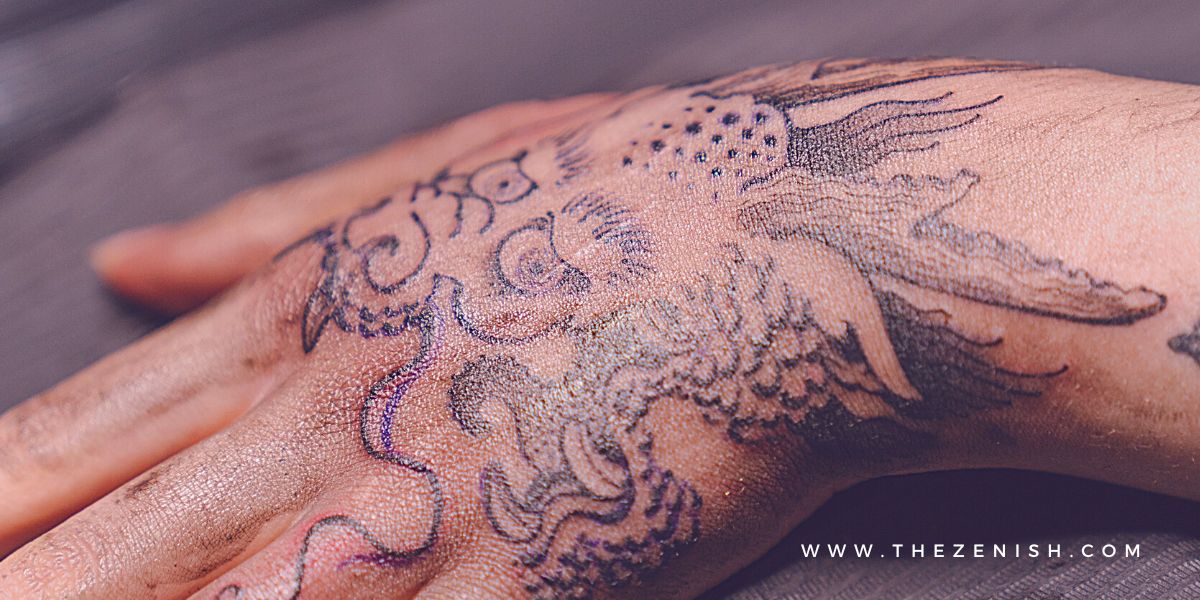
Both Cerave and Lubriderm are generally safe and effective for tattoo aftercare, but they can cause some side effects or risks in some people.
Some of the possible side effects or risks are:
Allergic reaction: Some people may be allergic to some of the ingredients in Cerave or Lubriderm, like parabens, lanolin, mineral oil, or fragrance.
This may cause itching, swelling, redness, rash, or hives on the skin.
If this happens please consult your doctor
Irritation: Some people may have sensitive skin that reacts to some of the ingredients in Cerave or Lubriderm, such as niacinamide, dimethicone, or petrolatum.
This may cause burning, stinging, tingling, or flaking on the skin.
If you experience any of these symptoms, consult with your doctor.
Breakouts: Some people may have oily or acne-prone skin that clogs easily from some of the ingredients in Cerave or Lubriderm, such as mineral oil, dimethicone, or petrolatum.
This may cause pimples, blackheads, or whiteheads on the skin.
Infection: Some people may not use Cerave or Lubriderm properly on their tattoos.
This includes applying too much or too little lotion, not washing their hands before applying lotion, not cleaning their tattoo regularly, or not following their tattoo artist’s instructions.
This can lead to bacteria or dirt entering the tattoo, potentially causing an infection.
And can result in pus, fever, pain, or swelling on the skin.
What are some alternatives to Cerave or Lubriderm for tattoos?
If you don’t like Cerave or Lubriderm for your tattoos, or if you have an allergy or sensitivity to some of their ingredients, you can try some of these other alternatives that are also good for tattoo aftercare.
Aquaphor: This is a healing ointment that contains petrolatum, lanolin, glycerin, and panthenol.
It can help heal and protect your tattoo by creating a barrier on the skin and locking in moisture.
It’s fragrance-free and non-comedogenic.
However, it can feel heavy and greasy on the skin and may cause allergic reactions in some people who are sensitive to lanolin.
Hustle Butter: This is a vegan tattoo balm that contains shea butter, mango butter, coconut oil, and sunflower oil.
It can help nourish and soothe your tattoo by providing natural fats and antioxidants to the skin.
Like the healing ointment, It’s fragrance-free and cruelty-free.
However, it may feel too oily or slippery for some skin types, and it may cause allergic reactions in some people who are sensitive to nuts or seeds.
After Inked: This is a natural tattoo lotion that contains grape seed oil, shea butter, jojoba oil, and vitamin E.
It can help hydrate and repair your tattoo by delivering essential fatty acids and vitamins to the skin.
It’s fragrance-free and paraben-free.
However, it may feel too light or watery for some skin types, and it may cause allergic reactions in some people who are sensitive to grapes or seeds.
You can also use other drugstore brands that are readily available like Cetaphil, and Dove.
Cerave vs Lubriderm for Tattoos: Which One Should You Use?
After all that, which lotion is actually better for tattoos?
Well, it depends (yeah, I know).
It depends on your preference and budget.
But if I I had to choose one, I’d go with Cerave.
Why?
Because Cerave has ceramides, hyaluronic acid, and dimethicone that can help restore and protect your skin barrier, retain moisture, and form a protective layer on the skin.
These are all important for keeping your tattoo healthy.
Cerave is also fragrance-free and non-comedogenic, which is important for tattoo aftercare because you don’t want to irritate or inflame your skin with harsh chemicals or fragrances.
You also don’t want to cause breakouts or acne on your tattooed area, which can affect the healing process and the quality of your ink.
It does have some drawbacks though.
- Some people can be allergic to some of the ingredients
- It can feel too thick and greasy for some skin types, especially oily or acne-prone skin.
- Some people prefer a lighter or more watery texture for their moisturizer, which can absorb faster and feel more refreshing.
If I were you I’d try both brands and see which one works better for me and my tattoo.
You may also want to try some of the alternatives suggested, like Aquaphor, Hustle Butter, or After Inked.
These are also great options for tattoo aftercare that have their pros and cons.
Ultimately, the choice is yours.
The most important thing is to take good care of your tattoo by keeping it clean and moisturized.
This can help prevent infection, scabbing, peeling, fading, or aging of your tattoo.
And don’t forget to enjoy your new ink! It’s a part of you now, so make sure it looks its best!

